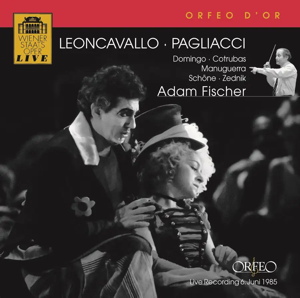
Ruggero Leoncavallo (1857-1919)
Pagliacci – Dramma in due atte (1893)
Canio: Plácido Domingo (tenor), Nedda: Ileana Cotrubas (soprano), Tonio: Matteo Manuguerra (baritone), Peppe: Heinz Zednik (tenor), Silvio: Wolfgang Schöne (baritone), Due Contadine: Josef Pogatschnig & Wolfgang Witte
Choir & Orchestra of the Vienna State Opera/Adam Fischer
rec. live, 6 June 1985, Wiener Staatsoper, Vienna, Austria
No libretto
Reviewed as download
Orfeo C240121 [74]
It is clear from the first notes that this will not be a routine performance of a well-worn score. Fischer dishes up a hefty but still-energetic reading of the introduction. The bass drum is brought to the fore, foreshadowing its importance in the coming scene as the players enter the village. The double bass section solo is soft, but they play with intentional phrasing, leading perfectly into the mischievous flute/piccolo pairing. Fischer adds an unwritten crescendo to the horn choir solo that adds an extra tinge of regret, and the following string solo has a rhythmic swing to it that is not usually present. As I listened to the opera while watching the score, I was struck repeatedly by the many specific musical points Fischer makes through slight changes in dynamics or articulations, or simply via emphasizing what Leoncavallo actually wrote. The pulsating strings and harp underneath Nedda’s “Taci, Silvio, non più, è deliro è follia!” receive the sforzando – piano accentuations found in the score, and for once actually succeed in indicating the beating heart of her affection and fear. Unlike many conductors, Fischer understands the importance of an audible bass line and seems to have marked up the dynamics of the double bass section throughout the score to provide a grounded, dramatic sound that also contributes an undercurrent of dread. I won’t go on, but suffice it to say, the orchestral contributions throughout are superb.
Matteo Manuguerra (1924-1998) was never high on anyone’s list as a “favorite” baritone, but his presence on the rosters of the world’s major opera houses was not a fluke; he was a solid professional, turning in respectable performances of the standard baritone repertoire. With this expectation in mind, the prologue comes as a bit of a surprise. Manuguerra requires some extra breaths to make it through his phrases, comes unglued from Fischer in the animando section, and completely bobbles the high note at “Poiche siam uomini” when he is unable to complete the flip from the passaggio E-flat to the F. The unwritten high A-flat is ok if thin, but he dismounts early, and the voice sounds frayed in the succeeding phrase. To be fair to Manuguerra, this is a very difficult aria to pop onstage and sing two minutes into the opera; but with memories of Bonelli, Tibbett, and Warren coming quickly to mind, it’s difficult not to be a bit disheartened given the quality of the remaining cast. The remainder of the opera occurs without incident for the baritone, but the performance is routine.
Domingo’s performance is spectacular from top to bottom. The vocal tone here is significantly more brilliant than on the earlier commercial recording conducted by Nello Santi. This may be the result of performing the piece in a hall for an audience, rather than for microphones; his vowels are noticeably brighter, and he tends to ride the high side of the pitch. He goes overboard with this in the famous aria, sharping on his high notes, but the characterization is such that it isn’t bothersome. Fischer’s accompaniment in the aria is wonderful, with sharper accentuation of the initial chords and again, noticeable engagement with the double basses in the final notes. The tenor’s vocal acting in the finale is heartbreaking; the undercurrent of rage in his responses to the stock jokes of Nedda/Columbina accelerate exactly as Leoncavallo indicates in the score, culminating in a “No, Pagliaccio non son” that is both frightening and intensely moving.
The Romanian soprano Ileana Cotrubas sings with the kind of musical freedom one expects from someone who has likely performed the role hundreds of times. From a technical standpoint, I suspect that her voice was one size too small for the role. In attempting to act out the scenes of aggression (first with Tonio, then with Canio in the finale), she resorts to pushing, and one can hear the voice fraying a bit. Although one feels for Cotrubas the singer in those moments, I appreciate her commitment to the character; the finale in particular makes for thrilling and dangerous drama. Her aria is lovely without being memorable, though she offers up some silvery high notes.
Wolfgang Schöne is appropriately enthusiastic as Silvio in his duet with Nedda, but there is a stolidity to the sound and the method of enunciating text that betrays non-Mediterranean origins. Although the duet is a highlight due to the contributions of Cotrubas and Fischer, frankly, if I were Nedda, I would have stuck with the much more exciting Canio.
This is a memorable Pagliacci, thanks mostly to the conductor and Canio.
Richard Masters
Previous reviews: Ralph Moore (May 2025) ~ Göran Forsling (May 2025)
Buying this recording via a link below generates revenue for MWI, which helps the site remain free.




















